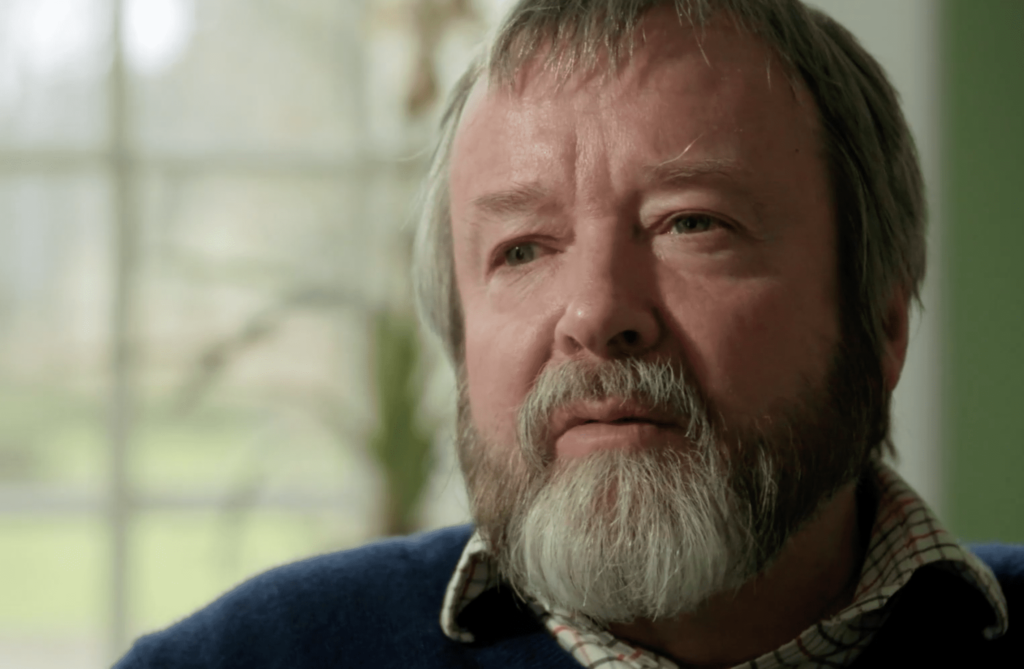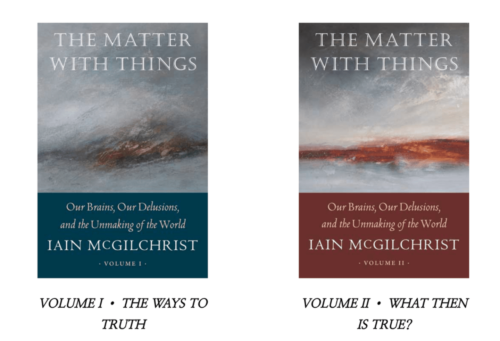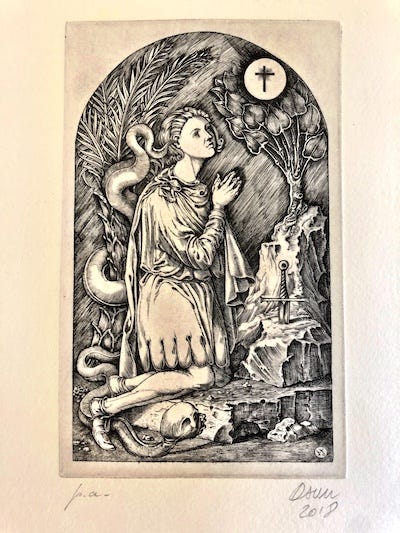Iain McGilchrist’s Great New Book

(Over on my subscription-only Substack (“Rod Dreher’s Diary”), which focuses more on spiritual matters, I’ve been writing about the new book by psychiatrist Iain McGilchrist. I’m going to repost one of the diary entries here, because it’s an important book that I want more people to know about — RD)
I am deep into Iain McGilchrist’s massive tome The Matter With Things: Our Brains, Our Delusions, and the Unmaking of the World, and I could not possibly be more delighted with it. Mind you, this book is about 1,500 pages in all, and comes in two volumes. If you want the hardback, you have to pay $157, but I got the Kindle version for $40. Not only is Kindle far easier for me to deal with as a researcher (it has a notes function that allows you to highlight passages you like, and export them via e-mail to your laptop), but with a book this big, it’s easier on the wrists. At the end of this post, you will know if someone you know would like to get this book for Christmas; it appeals to a certain kind of person, and boy oh boy, am I ever that kind of person. It might be too late to get the hardback, but not the Kindle version.

The first part of the book is a fairly technical discussion of neuroscience, and what it has to tell us about perception. As you know if you read Dr. McGilchrist’s previous work, The Master And His Emissary: The Divided Brain and the Making of the Western World, the psychiatrist focuses on the different ways of processing information in the left hemisphere and the right hemisphere. I don’t want to go into explaining his basic hypothesis here, so if you are just coming to his work, check out the basics on Channel McGilchrist.
This new book seems to be more focused on the philosophical and metaphysical implications of his thesis. It’s hard to say for sure, because this is a massive book, and I’m only about a third of the way through it. The first part of the book is fairly technical, presenting a massive amount of neuroscience research about the two hemispheres, and how deficits in one affects a person’s perception. The core idea is that the left brain is logical and analytical, while the right brain is more intuitive. Rather than try so summarize the new book myself, let me post this from Channel McGilchrist:
In this landmark new book, Iain McGilchrist addresses some of the oldest and hardest questions humanity faces – ones that, however, have a practical urgency for all of us today:
- Who are we?
- What is the world?
- How can we understand consciousness, matter, space and time?
- Is the cosmos without purpose or value?
- Can we really neglect the sacred and divine?
In doing so, he argues that we have become enslaved to an account of things dominated by the brain’s left hemisphere, one that blinds us to an awe-inspiring reality that is all around us, had we but eyes to see it. He suggests that in order to understand ourselves and the world we need science and intuition, reason and imagination, not just one or two; that they are in any case far from being in conflict; and that the brain’s right hemisphere plays the most important part in each. And he shows us how to recognise the ‘signature’ of the left hemisphere in our thinking, so as to avoid making decisions that bring disaster in their wake.
Following the paths of cutting-edge neurology, philosophy and physics, he reveals how each leads us to a similar vision of the world, one that is both profound and beautiful – and happens to be in line with the deepest traditions of human wisdom.
It is a vision that returns the world to life, and us to a better way of living in it: one we must embrace if we are to survive.
You can see why I am intensely interested in this book as research for my own project.
Here are some of the passages that really jumped out at me:
And the whole is shot through with purpose (a notion, by the way, that has nothing to do with some sort of engineering God), and endlessly creative, not pointless and passive. This cosmos is one from which we are never separate, but out of which we arise, in which we dwell, and to which, finally, we return.
More:
The world we know cannot be wholly mind-independent, and it cannot be wholly mind-dependent. Once again, this leaves no room for a philosophy of ‘anything goes’. What is required is an attentive response to something real and other than ourselves, of which we have only inklings at first, but which comes more and more into being through our response to it–if we are truly responsive to it. We nurture it into being; or not. In this it has something of the structure of love.
More:
Once again, the whole illuminates the parts as much as the parts can illuminate the whole. To the left hemisphere, you find the truth about something by building it up from bits. But, as the right hemisphere is aware, to understand it you need to experience it as a whole, since the whole reveals as much about the nature of the parts as the parts do about the nature of the whole.
And:
This clarification was necessary, because I will be explaining that the world we experience–which is the only one we can know–is affected by the kind of attention we pay to it. This implies that there is no simple and single, wholly mind-independent, truth. What I did not want to appear to be saying, at any cost, was that there is no such thing as truth; or that reality is simply made up at our whim. Absolutely not.
This is important to understand. He is not a relativist! But he is trying to help his readers to see that we, the observing subjects, have a role to play in determining our own sense of reality. Reading McGilchrist’s new book, I understand more deeply the meaning of the St. Galgano image, “The Temptation of St. Galgano,” which a Genoese artist gave me under mysterious circumstances:
The temptation of St. Galgano is to take his eyes off of God, to divide his attention.
The most exciting thing I’ve learned so far from the new book is how Orthodox Christianity works. I have lacked the conceptual vocabulary to explain it, even to myself. Well, now I get it. McGilchrist’s thesis is that we in the West have allowed our collective mind to be unhealthily dominated by the left brain, which prioritizes propositional thinking, and mistrusts intuition and other noetic ways of knowledge. He writes in this rich passage:
We now tend to think of truth as a matter of propositions. The word ‘truth’ in its origin indicates not a proposition, but a disposition. ‘True’ (cf German treu, faithful) is related to ‘trust,’ and is fundamentally a matter of what one believes to be the case. Truth and trust (belief) go together. One cannot have trust in a society where there is no truth; and one cannot be true to a society in which there is no trust. That is of fundamental importance, since, as Confucius told his disciple Tzu-kung, for a stable society a ruler needs three things: weapons, food and trust. If he cannot hold all three, he should forgo weapons first, and food next; for ‘without trust we cannot stand’.
Belief too is about fidelity (Latin fides, faith). The word ‘belief’ has nowhere buried in it the idea of signing up to a proposition, certain or uncertain. It is not a matter of cognition, but of recognition. The word belief comes from the same root as the word ‘love’, a sense preserved in the now archaic word ‘lief’, familiar to us from Shakespeare, with which one once described one’s friend, sweetheart, or lord–someone in whom one believed.
Belief is about relationship, in which by definition, more than one party is involved. The believer needs to be disposed to love, but the believed-in needs to inspire another’s belief or trust. Whether this amounts to being worthy of that belief cannot be fully determined in advance. It emerges only through commitment and experience.
Be that as it may, I think it possible that some of the disagreements in the debate about truth start with these broad differences in whether we see ‘truth-as-correctness’, a thing that can be determined, and into which nothing of us enters; or ‘truth-as-unconcealing’, a process of something revealing itself to us only through our experience. (Heidegger often used the Greek word for truth, aletheia, which literally means ‘un-forgetting’, allowing something to emerge from oblivion.)
How do we decide which way of conceiving truth is truer? First, notice that a process, unlike a thing, suggests the importance of not just the whatness, but the howness. There are no deep truths that are separate from the manner in which they are expressed. As the philosopher Friedrich Waismann puts it:
If you ever try to put some rare and subtle experience, or a half forgotten impression, into words, you’ll find that truth is intrinsically tied up with the style of your expression: it needs no less than a poet to render fully and faithfully such fragile states of mind.
Which is why we honour poetry as a path to truth. As I will argue, the most fundamental truths, of both a physical and psychical nature, can ultimately be expressed only in terms of poetry. And Waismann points out that the meaning of the word truth differs with context, so that it has ‘a systematic ambiguity’, as have deceptively simple sounding words such as fact, statement, knowledge, law and many others.
And:
Very little that we take for granted as most essential to life–love, energy, matter, consciousness–can be convincingly argued about, or even described, without becoming ultimately self-referential. You have to experience it to know it: all we can do is point.
This is why you hear Orthodox Christians telling those interested in Orthodoxy to “come and see”. This sounds dubious from the outside, but once you’ve been in Orthodoxy, you understand it. McGilchrist explains this pretty clearly. Orthodoxy has propositional truths within it, of course, but the emphasis is on truth-as-process. That is to say, all Truth is in Jesus Christ; the Orthodox way of life is a constant, lifelong process of surrender to that Truth, and becoming divinized through it. Orthodox Christianity is knowing-as-poetry, not as syllogism. This is why people who grew up in a left-brained culture view this with suspicion. My experience as an Orthodox Christian is why this line from McGilchrist rings in me like a struck bell: “Whether this amounts to being worthy of that belief cannot be fully determined in advance. It emerges only through commitment and experience.”
You can read a review of a film, but it’s not the same thing as experiencing the film. You can even read a summary of the film, scene-by-scene, and it will only be a pale approximation of the experience. That’s how Orthodoxy is. Mind you, McGilchrist does not call for abandoning the left-brain mode of analysis, but rather says that we must rebalance the relationship, because we in the West are choosing to blind ourselves to a valid way to experience reality, and Truth.
A few years ago, I corresponded with Dr. McGilchrist. He told me that he is not a religious believer, but if he were, he would convert to Orthodoxy, because in his experience, it is the form of Christianity that best balances the hemispheric ways of knowing.
—
By the way, there’s a great documentary about McGilchrist’s previous book, The Master and His Emissary: The Divided Brain and The Making of the Western World. You can rent it here on Vimeo. Highly recommended!
UPDATE: A reader in the comments section recommends this lecture by Dr. McGilchrist to an audience at Ralston College. In it, he talks about themes in the new book. I’ve just approved several comments by readers who condemn McGilchrist’s work without understanding what he’s saying. If you disapprove of his actual argument, that’s fine — but y’all are condemning him based on a misunderstanding of his argument. Maybe this will help:

Subscribe for as little as $5/mo to start commenting on Rod’s blog.